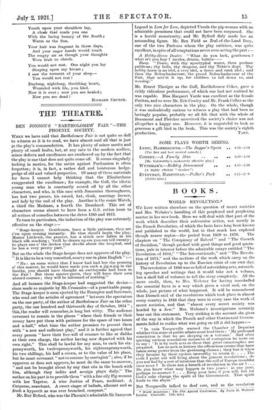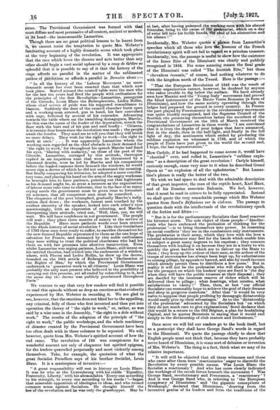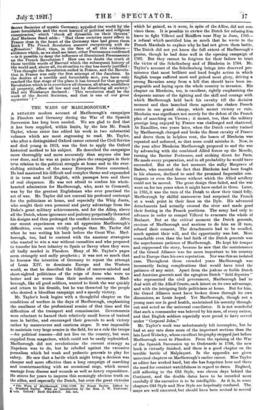BOOKS.
WORLD REVOLUTION.*
WE have written elsewhere on the question of secret societies and Mrs. Webster's handling of this perplexed and perplexing matter in her new book. Here we will deal with that part of the work which describes their subversive action, not merely in the French Revolution, of. which the facts have long been known and published to the world, but in that much less explored
though nearer region—the period from 1820 to 1870. The chapters on "The Conspiracy of Babetif " and "The Growth of Socialism," though packed with good things and good quota- tions, pale in interest before the admirable essays entitled "The Revolution of 1848," "The Internationale," and "The Revolu-
tion of 1871," and the sections of the work which carry on the history of Revolution up to the Russian crisis of our own day. The revolution of 1848 was so full of astonishing acts, astonish-
ing speeches and writings that it would take not a volume, but a shelf full of volumes to tell the story completely. All the more credit, then, to Mrs. Webster for having marshalled the essential facts in a way which gives a vivid and, on the whole, just picture of what happened. It will be remembered that Disraeli said of the revolutions which took place in almost every country in 1848 that they were in every case the work of secret societies, and that "almost every secret society was headed by a Jew." Mrs. Webster's investigations certainly bear out this statement. Very striking is the account she gives of the way in which the French and other Continental Govern- ments failed to realize what was going on till it did happen :—
" In vain Tocqueville warned the Chamber of Deputies whither this state of public affairs must lead them : My profound conviction is that we are sleeping on a volcano.' And after quoting various scandalous instances of corruption ho wont on to say : 'It is by such acts as these that great catastrophes are prepared. Let us seek in history the efficacious causes that have taken away power from the governing classes ; they lost it when they became by their egoism unworthy to retain it. . . . The evils I point out will bring about the gravest revolutions ; do you not feel by a sort of intuition that the soil of Europe trembles once more ? is there not a breath of revolution in the air ? Do you know what may happen in two years : in one year, perhaps to-morrow ? . . . Keep your laws if you will, but for God's sake change the spirit of the Government. That spirit leads to the abyss.' "
But Tocqueville talked to deaf ears, and so the revolution
• World Reno:won: The Plot Againet Civilization. 13y /iota IL Webster. London. Constable. (18s. net.]
tame. The Previsional Government was formed with that most diffuse and most persuasive of all orators, ancient or modern, )te head—the immeaeurable Lamartine.
Theugh there are no great political lessons to be learnt from *it, 'lie- cannot resist the temptation to (-pole Mrs. Weheter's
faichiating account of a highly 'dramatic scene which took pinee - - - at the eery beginning' of the 'revolution. It was appropriate that the race which loves the theatre 'and acts better than any other should begin a vast social upheaval by a coup di &Wire so splendid that it is possible to say of it that the history of the stage afforcla no parallel in the matter of the sublimated pathos_ of jr*riotisni. _or affords a parallel in _Berenice alone
"In all the history of the Labour Movement', no more
dramatic scent has ever been enacted than that which now took place. Sealed aiound the council table were the men Who for the last ten years had fired the people with enthusiasm for the" piinciples of the first Revolution—Lamartine, panogyrist of the Gironde, Louis Blanc the Robespierriste, Ledru Rollin, whose chief solve° of pride was his supposed resemblance to Denton. Suddenly the door of the council chamber burst open
and a working-man entered, gun in hand, his face convulsed with rage, followed by several of his comrades. Advancing towards the table where sat the trembling demagogues, Marche, for this was the name of the leader of the deputation, struck the floor with the butt end of his gun and said loudly : 'Citizens, it is twenty-four hours since the revolution was made ; the people await the results. They send me to tell you that they will brook no more delays. They wish for the right to work—the right to work at once. . . . It was apparently Lamartine whom the working-men regarded as the chief obstacle to their demand for the right to work,' for throughout his speech Marche had fixed his eyes, blazing with audacity,' on those of the poet of the Gironde. Lamartine, outraged by this attitude, thereupon replied in air imperious tone that were he threatened by a thousand deaths, a-ere he led by Marche and his companions before the loaded cannons down beneath the windows, he would never sign a decree of which he did not understand the meaning. But finally conquering his irritation, he adopted a more concilia- tory tone, and placing his hand on the arm of the angry workman he besought him to have patience, pointing out that legitimate as his demand might be, so great a measure as the organization of labour must take time to elaborate, that in the face of so many crying needs the government must be given time to formulate its schemes, that all competent men must be consulted. . . . The eloquence of the poet triumphed, gradually Marche's indig- nation died down ; the workmen, honest men touched by the evident sincerity of the speaker, looked into each other's eyes questioningly, with an expression of relenting, and Marche, interpreting their attitude, cried out, Well, then, yes we will wait. We will have confidence in oar government. The people will wait ; they place three months of misery at the service of the Republic ' Have more pathetic words ever been uttered in the whole history of social revolution ? Like their forefathers a 1792 those men were ready to suffer, to sacrifice themselves for the new-formed Republic represented to them as the one hope of salvation for France, and animated by this noble enthusiasm they were willing to trust the political charlatans who had led them on with fair promises into abortive insuriection. Even whilst Lamartine was urging patience, Louis Blanc, still intent on his untried theories, had retired into the embrasure of a window, where with Flocon and Ledru Rollin' he drow up the decree, founded on the 10th article of Robespierre's Declaration of the Rights of Man,' by which the Provisional Government undertook to guarantee work to all citizens.' Louis Blanc was probably the only man present who believed in the possibility of carrying out this promise, yet all ended by subscribing to it, and the same day tha decree was publicly proclaimed throughout Paris."
We venture to say that very few readers will find it possible to read this episode without as deep an emotion as that evidently experienced by Mrs. Webster in recording it. We are glad to see, however, that the emotion does not blind her to the appalling, nay criminal, folly of those who first invented and then put into operation the theory of " the right to -work," or, rather, as was said by a wise man in the Assembly, "the right to a dole without work." The results of the adoption of the principle of "the right to work," the public workshops, and the whole machinery of disaster created by the Provisional Government have been too often dealt with in these columns to be repeated. We will, however, quote from Mrs. Webster's spirited account of how the end came. The revolution of 184 was conspicuous for a wonderful amount not only of eloquence but spirited. epigram, for the leaders quarrelled perpetually and most violently among themselves. Take, for example, the quotation of what the great Socialist Proudhon says of his brother Socialist, Louis Blanc. It is a masterpiece of invective :— " A great responsibility will rest in history on Louis Blanc. It was he who at the Luxembourg with his riddle 'Equality, Fraternity, Liberty,' with his abracadabra ' Every one according to his strength, to every one according to his needs I '—began that miserable opposition of ideologies to ideas, and who roused common sense agamst Socialism. He thought himself the bee of the revolution and he was only the grasshopper. May he
• — -
. -
at last, after having peisoned.the- working-mem his absurd formulas, bring to the cause of CZ tieletariat. Web on ,a day of error fell into his fechle handiiite- oho! (if his absteation -and
his silence!" :- - - ?
Incidentally, Mrs. Webster quotes' baie from Lamartinee
speeches which all those who love the liumcrur of the French: revolutionary spirit will not fail to regard as a priceless treasurer Incidentally;too, the passage is -useful to-show how the existence' of the Inner Rite of the Illuininati Was clearly and publicly , recognized in 1848. For some amazing reason the final grade of the illuminati was called " The Scottish Rite," but these " chevaliers tccosseis," of course, had • nothing whatever to do with the kingdom north of the Tweed. • Here is the passage :— " That the European Revolution of 1848 was the 'result of masonic organization cannot, however, be doubted by anyone who takes trouble to dig below the surface. We have already seen how Mazzini and the ' Young Italy ' movement had proved the blind instruments of the Haute Yenta Romaine (a form of Illuminism], and how the same society operating through the lodges had prepared the ground in every country. In France the part played by Freemasonry in the revolutionary movement was quite frankly recognized, and the Supreme Council of the Scottish rite presenting themselves before the members of the Provisional Government on the 10th of March received the congratulations 'of Lamartine in these words : I am convinced that it is from the depths of your lodges that have emanated, first in the shade, then in the half-light, and finally in the full light of day, the sentiments which ended by producing the sublime explosion we witnessed in 1789, and of which the people of Paris have just given to the world the se cond and, 1 hope, the last representation.'"
How Carlyle, if he had happened to come across it, would have " chortled " over, and rolled in, Lamartine's "sublime explo- sion " as a description of the great revolution ! Carlyle himself, curiously enough, came very near to it when he described Grand Opera as "an explosion of all the upholsteries." But Lamar. tine's phrase is really the better of the two.
We wish we had space to deal with the admirable description of that great impostor, the man of the reptile heart, Karl Marx, and of his Russian associate Bakunin. We feel, however, that it must be read in &Wens() to be fully appreciated. Instead we shall quote the very remarkable passage which Mrs Webster quotes from Sorel's Rejlexions stir is violence. The passage in question deals with the intellectuals of the revolutionary epoch, of the forties and fifties :— • " But it is for the parliamentary Socialists that Sorel reserves his bitterest scorn. The sole object of these people= Intellec- tuals who have embraced the profession of thinking for 'the proletariat '—is to bring themselves into power. In reasoning on social conflicts they see in the combatants only instruments. The proletariat is their army, which they love with the love a colonial administrator may feel for the bands which enable him to subject a great many negroes to his caprices ; they concern themselves with leading it on because they are in a hurry to win quickly the great battles which are to deliver up the State to thorn; they keep up the ardour of their men, as the ardour of the troops of mercenaries has always been kept up, by exhortations to coming pillage, by appeals to hatred, and also by small favours which already permit them to distribute a few posts.' But in reality it will not be the proletariat who will share the spoils, for the prospect on which the loaders' eyes are fixed is the day when they will have the public treasure at their disposal ; they are dazzled by the immense reserve of riches which will be delivered then to pillage; what feastings, what cocottes, what satisfactions to vanity ! ' Then, then, at last our official Socialists can reasonably hope to achieve the goal of their dreams and sleep in gorgeous mansions.' After that it would be very naive to suppose that people profiting by demagogic dictatorship would easily give up their advantages.' As to the dictatorship of the proletariat' advocated by the Socialists but on which they do not much care to give explanations,' Sorel declares that this would be a return to the Old Regime, a plan for feudaliring Capital, and he quotes Bernstein in saying that it would end simply in the dictatorship of club orators and litterateurs."
Once more we will bid our readers go to the book itself, but as a postscript they shall have George Sand's words in regard to the illuminati. We quote the passage chiefly to show that' English people must not think that, because they have probably never heard of Illuminism, it is some sort of delusion or invention of Mrs. Webster's. The thing is a fact, think what we may of its relative importance.
"It will still be objected that all these witnesses and those who came after them were reactionaries ' eager to discredit the Revolution by every possible /110a/18. Was LOWS Blanc- the Socialist a reactionary ? And who has more clearly indicated the workings of the occult forces beneath the movement ? Was George Sand, revolutionary and Freemason, a reactionary ' ? And it was George Sand who, in referring to the' European conspiracy _of Illuminism ' and the gigantic conceptions of Weishaupt,' declared that Illuminism, drawing from .the inventive genius of its leaders and from the 'traditions Of the Seeret Societies of--myetic Germanr,lippalled the wield, :byt,lte-' most iormidable and the most learned of political and religious conspiracies,' .which shook all dynasties on "their -thrones.' And Madame Sand adds : Had these eocieties more 'effect in France. than in the, heart of the Germany..tbat had given them birth 1, The French Revolution answers energetically with the affirincitive.1 Bo*, then in the 'face of all this "evidance evidence which, as we shall see later, other Freemasons confirmed --is it possible todeay the influence of-illuminized Freemasonry on the French Revolution ? How can. we doubt the truth of those terrible words of "13arruel which the subsequent history of the World and, above all, its situation to-day has surely-juitiffed : 'You thought the Revolution ended in France, and the Revolu- tion in France was only the first attempt of the Jacobins. -_ In the desires of a terrible and formidable sect, you have -only reached the first stage of the plansit his formed for that general Revolution which is to overthrow all thrones, all altars, annihilate all .property, efface all law and end by- dissolving all society.'
Had not Weishaupt declared This revolution shall be the work of the .Secret Societies, and that is one of Our great mysterniti ' .? " .












































 Previous page
Previous page